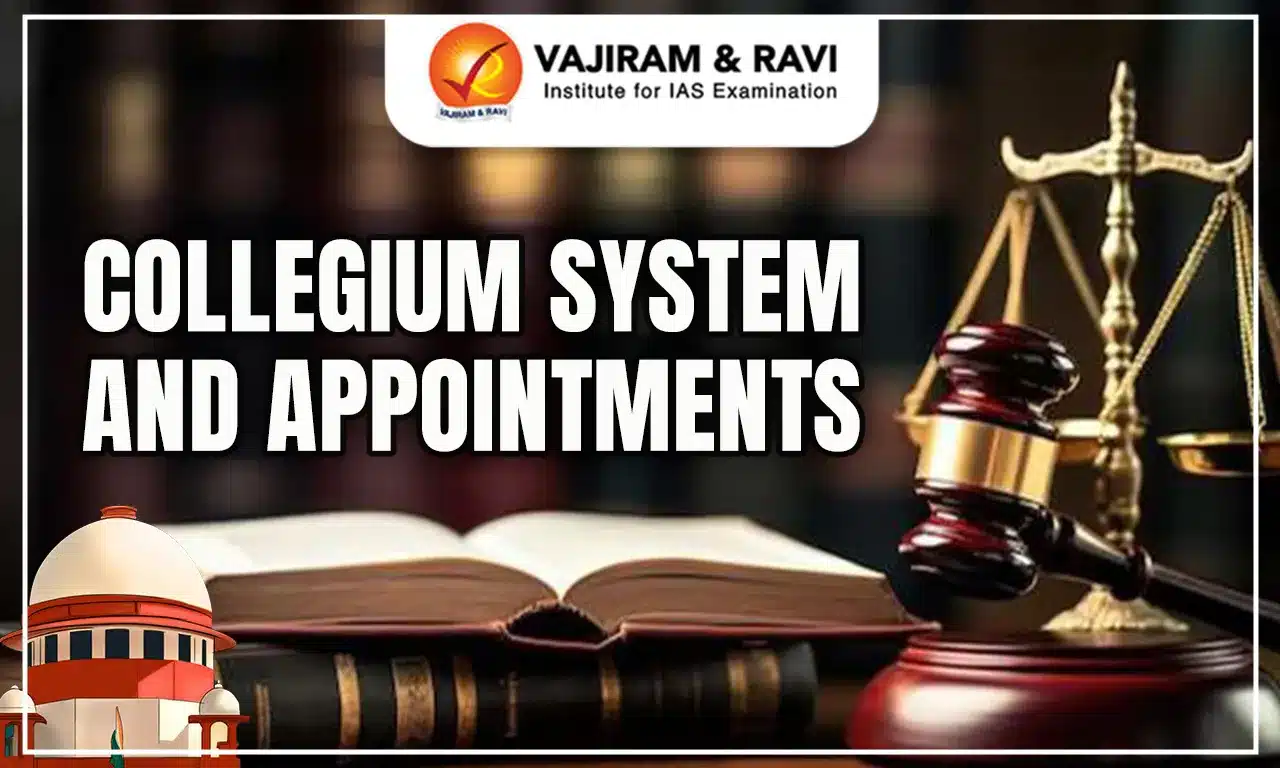What is the Collegium System in the Indian judiciary?
The Collegium system is a system for the appointment and transfer of judges in the Supreme Court and High Court.
- It is not rooted in the Constitution. Instead, it has evolved through judgments of the Supreme Court.
- Under the system, the Chief Justice of India (CJI), along with four senior-most Supreme Court judges, recommends the appointment and transfer of judges.
- A High Court Collegium, meanwhile, is led by the incumbent Chief Justice and the two seniormost judges of that court.
- The government can also raise objections and seek clarifications regarding the Collegium’s choices, but if the Collegium reiterates the same names, the government is bound to appoint them to the post.
Constitutional Provisions for Judicial Appointments
| Articles | Constitutional Provisions |
| Article 124 | Supreme Court judges should be appointed by the President after consultation with such judges of the High Courts and the Supreme Court as the President may deem necessary. The CJI is to be consulted in all appointments except his or her own. |
| Article 217 | High Court judges should be appointed by the President after consultation with the CJI and the Governor of the state. The Chief Justice of the High Court concerned too should be consulted. |
What is the genesis of the collegium system in India?
The collegium system has its genesis in a series of Supreme Court Judgements:
- S P Gupta Vs Union of India, 1981 (First Judge Case): Supreme Court held that consultation in the process of appointing judges does not require concurrence, and instead only involves the exchange of views.
- Supreme Court Advocates-on-Record Association Vs Union of India, 1993 (Second Judge Case): The Supreme Court reversed it's previous and altered the definition of consultation to mean concurrence.
- It was decided that the advice tendered by the CJI in regard to the appointment of judges to the Supreme Court is binding on the President.
- Further, the CJI is required to consult with two of his most senior colleagues before tendering such advice.
- Third Judge Case,1998: Supreme court stated that the consultation process to be adopted by the CJI requires ‘consultation of plurality judges’.
- The CJI should consult a collegium of four senior most judges of the Supreme Court. Even if two judges give an adverse opinion, they should not send the recommendation to the government.
- National Judicial Appointments Commission (NJAC) Act, 2014: It was brought to replace the existing collegium system for appointing judges.
- However, a five-judge Constitution Bench declared it as unconstitutional and nullified it, stating that it posed a threat to the independence of the judiciary.
Why is the collegium system criticized?
Some of the criticism against the collegium system are
- Lack of transparency: The collegium system is often criticized for its lack of transparency, as the reasons for the collegium's decisions are not disclosed to the public.
- Judicial vacancies: It has struggled to keep up with the stagnant vacancies in the judiciary leading to the pendency of cases.
- As of August 2022, there are still 3 vacancies in the Supreme Court and 380 vacancies in the High courts.
- Charges of nepotism: There have been allegations of nepotism and favouritism in the collegium system.
- The Law Commission in 2009 also noted that nepotism and political privilege was rife in the workings of the collegium system.
- Against the system of checks and balances: The collegium system violates the principle of checks and balances as it ensures the complete exclusion of the executive from the judicial appointment process, which leads to a lack of accountability.
- Lack of representation of women: The collegium system does not ensure adequate representation of women in the judiciary.
- Example: In the Supreme Court, there are currently four women justices out of the sitting 33. Whereas in High Courts, women judges constitute 11.5%.
- Transfer of judges: Currently, the Supreme Court and the government do not disclose the reason for a transfer of judges. There is a possible threat to judicial independence.
What steps have been taken to improve the process of judicial appointments?
- 99th Constitutional Amendment Act, 2014: It provided for the National Judicial Commission (NJAC) to replace the collegium system for the appointment of judges.
- However, it was struck down by the Constitutional bench for being violative of the independence of the judiciary.
- Memorandum of Procedure (MoP): The MoP is the list of rules and procedures for the appointment of judges to the Supreme Court and the high courts. It is a document framed by the government and the judiciary together.
- The Union government framed an MoP on 30 June 1999.
- The current MoP gives out the detailed procedure for the appointment of Supreme Court and high court judges.
- It states that all appointments of judges to the Supreme Court must be recommended by the Collegium, composed of the Chief Justice of India and the four senior-most judges of the Supreme Court. This recommendation is then sent to the central government. The law minister will forward it to the prime minister, who is to advise the President on the appointment.
- Revised MoP: In 2015, the Supreme Court instructed the central government to develop a new MoP to ensure transparency in the collegium's proceedings. In 2017, although the MoP was finalized, the government did not adopt it, citing a need to reconsider the matter.
What can be the way forward to streamline judicial appointments in India?
- Reforming the MoP: The existing MoP should be reformed. This can include involving representatives from both executive and judiciary in decision-making for judges' appointments to ensure checks and balances.
- Expanding eligibility criteria: It should include, apart from the criteria envisaged in Constitution, other criteria for the determination of merit and suitability of candidates
- There can be an open invitation for all eligible candidates to apply for the vacancy in the judiciary in the prescribed format.
- Increasing diversity: Women should be provided adequate representation in judicial appointments.
- Increasing transparency: A list of candidates, who had applied, nominated, or considered by the members of the collegium on their own, should be maintained.
- All opinions of the collegium can be exchanged in writing.
- Proceedings of the collegium should be documented and recorded in the minutes.
- Law Commission of India recommendations:
- There should be an equal role for the judiciary and the executive in the selection and appointments of judges to High Courts and the Supreme Court.
- The retirement age of the Judges of the High Court should be increased to 65 years, and that of the Judges of the Supreme Court should be increased to 68 years.
- Article 124(3) contemplates the appointment of judges of the Supreme Court from three sources. However, in the last fifty years, not a single distinguished jurist has been appointed. From the Bar also, less than half a dozen judges have been appointed. It recommended that suitably meritorious persons from these sources are appointed.
Last updated on November, 2025
→ Check out the latest UPSC Syllabus 2026 here.
→ Join Vajiram & Ravi’s Interview Guidance Programme for expert help to crack your final UPSC stage.
→ UPSC Mains Result 2025 is now out.
→ UPSC Notification 2026 is scheduled to be released on January 14, 2026.
→ UPSC Calendar 2026 is released on 15th May, 2025.
→ The UPSC Vacancy 2025 were released 1129, out of which 979 were for UPSC CSE and remaining 150 are for UPSC IFoS.
→ UPSC Prelims 2026 will be conducted on 24th May, 2026 & UPSC Mains 2026 will be conducted on 21st August 2026.
→ The UPSC Selection Process is of 3 stages-Prelims, Mains and Interview.
→ UPSC Result 2024 is released with latest UPSC Marksheet 2024. Check Now!
→ UPSC Prelims Result 2025 is out now for the CSE held on 25 May 2025.
→ UPSC Toppers List 2024 is released now. Shakti Dubey is UPSC AIR 1 2024 Topper.
→ UPSC Prelims Question Paper 2025 and Unofficial Prelims Answer Key 2025 are available now.
→ UPSC Mains Question Paper 2025 is out for Essay, GS 1, 2, 3 & GS 4.
→ UPSC Mains Indian Language Question Paper 2025 is now out.
→ UPSC Mains Optional Question Paper 2025 is now out.
→ Also check Best IAS Coaching in Delhi
Collegium System FAQs
Q1. Who appoints the judges of the Supreme Court and High Court?+
Q2. When was Collegium adopted in India?+
Tags: collegium system quest

















